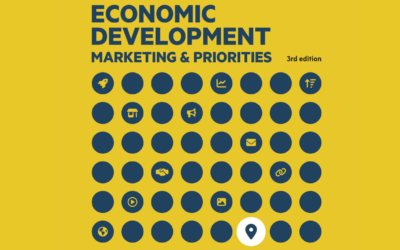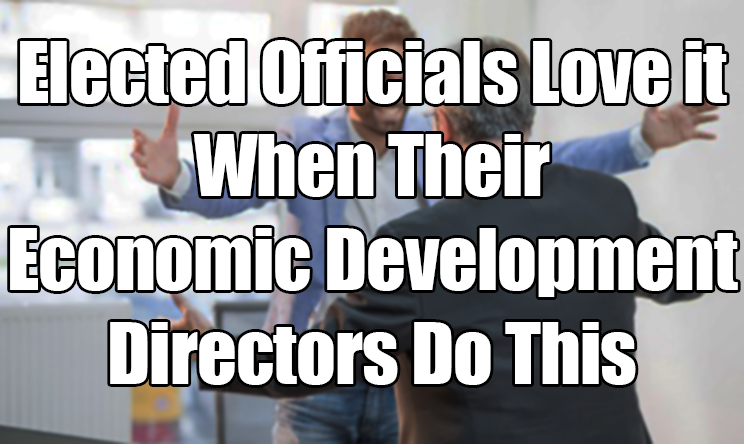
Elected officials love it when their constituency is happy with their performance and which results in their reelection to another term in office. A key element of these things happening is the success of economic development in the geography they serve.
The people who come to either complain about or thank these elected officials at public meetings are voters living in their district. These voters reelect or remove them from office. Therefore, the importance of keeping local voters happy is essential for a successful elected official. It isn’t the people outside of their district that will vote them in or out of office.

Within this context, it makes sense that if economic development directors help local businesses and residents succeed they are doing things that their elected officials can point to which shows how they are helping their voting constituency. A direct way that economic developers can impact this segment of their community is through the direct assistance of local businesses, business owners, and entrepreneurs.
Local businesses employ local employees who vote and pay local taxes (which fund local economic development). If the people who own or work for these businesses see that their government is doing good things for them they will want to thank these elected officials with their continued support, including at the ballot box for their reelection.

Whether true or not, there is a common perception among a portion of local businesses that economic development is a benefit for companies outside of the community and that economic development efforts are primarily focused on recruiting these out-of-town corporations (whose owners and employees didn’t even get the politician elected). This perception is strengthened when local business owners and employees see that out-of-town businesses are offered financial incentives to come to town that the local businesses can’t get even though they have been loyally committed to the community by staying in business for years. This type of external economic development can actually hurt local politicians and their ability to get reelected.
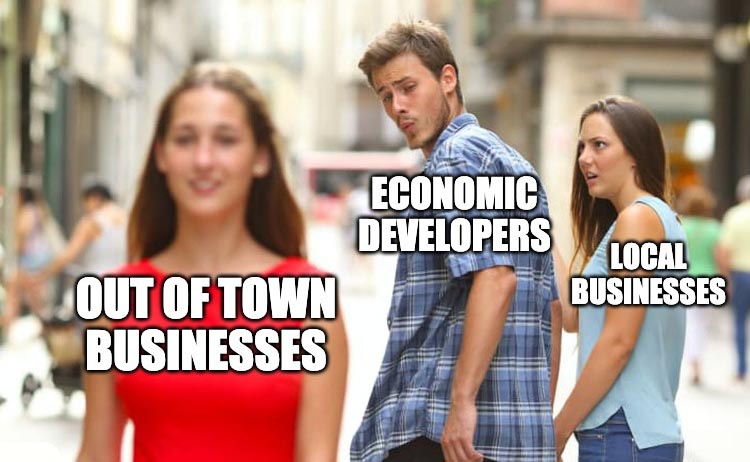
Economic developers can combat this perception and make their elected officials look like heroes to their local businesses and their employees through programs, policies, and assistance. Here are programs that economic developers can implement in partnership with elected officials:
1. INNOVATIVE PROGRAMS
The introduction of online services has transformed every industry. Economic development is following this same path for improvement. For economic development, digital services provide a solution to the key problems of providing services to local businesses at times and locations that are convenient for them. Digital services can be accessed anytime and anywhere to serve the largest audience of local businesses. Online assistance is also exceedingly affordable because software does the work.
Online Research Assistance
In today’s information economy, businesses without access to information are at a higher risk for failure or stunted growth. Small businesses are informationally disadvantaged because they have not been able to access, afford, or understand business intelligence like large companies. Fortunately, elected officials and economic developers can now become heroes that level the competitive business playing field by providing their local businesses with high-quality and easily understandable market research that is available by placing SizeUp LBI on your own government website. The service is free to local small businesses and affordable to EDOs. By putting this software service on your website elected officials can receive credit for new online information being made available to the local businesses they represent and a champion of elevating small business access to information.
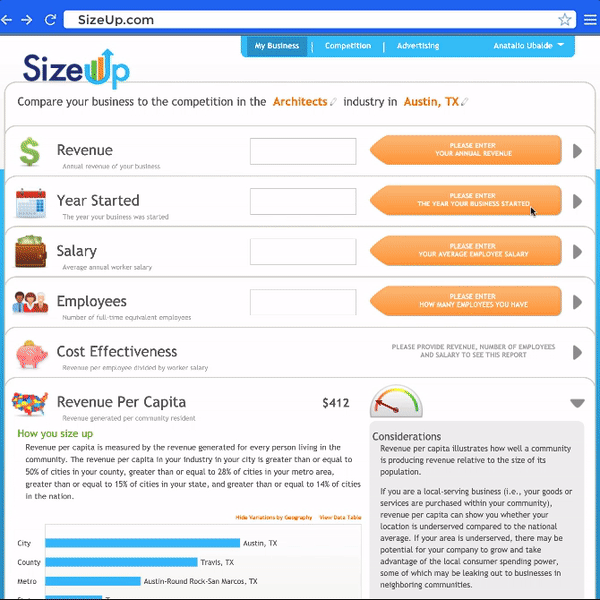
Online Training
Business education and training from top university professors can now be accessed by entrepreneurs for free through the Massive Open Online Courses (MOOC) provided by edX in partnership with MIT, Harvard, UC Berkeley, and The University of Texas and 120 other partners. edX has hundreds of available courses for business and management. There are also for-profit online business training platforms such as Udemy that provide thousands of courses for small business owners, managers, and entrepreneurs. As an economic development organization, you can link to these services from your website and promote these professional development opportunities to small businesses and entrepreneurs in your community at low or no cost, enabling elected officials to receive credit for new online training becoming available to local businesses.
2. TRADITIONAL PROGRAMS
Successful economic development organizations have provided assistance to local businesses for a long time. Business Retention and Expansion programs and incubators have been historically used in this capacity.
Business Retention and Expansion
Business Retention and Expansion (BRE) is a program to keep existing employers in the region and help them grow. BRE has traditionally been implemented through personal meetings of economic development staff with company owners and managers. Surveys and meetings are designed to learn about the opportunities and challenges companies are experiencing and then creating programs and services to address these individual or shared issues. Although it varies by organization capacity and priority, because “A business retention program is time and labor intensive,” BRE programs typically target the largest and most strategic businesses in the area by design. A benefit of BRE is that it is personable and good for relationship building. Inviting elected officials along for BRE meetings can enable the politician to develop a stronger relationship and better understand the challenges businesses experience. A liability of BRE is that the individualized meetings and follow up limit the volume of businesses that can receive assistance.
Incubators
Incubators provide a physical location with shared services to help companies get started and become stable enough to do business independently. They often reduce costs by having shared office resources such as telecom, meeting rooms, and and office equipment. Also, incubators may provide small business training and education. More recently, the private sector has entered this market through the creation of coworking offices. Demand for this type of space has grown to serve the growing number of contract workers. However, research is examining the potential ineffectiveness of incubators and whether they are simply self-serving. Research from the Kauffmann Foundation questions how incubators which typically only have 2 employees can impact so many companies. If your EDO is starting an incubator it needs to consider having the correct resources, staffing, mentors, and evaluation to be successful. The opening of an incubator is an ideal opportunity to involve your elected officials in a ribbon-cutting that is well designed for media coverage and photo opportunities.
3. PERSONAL PROGRAMS
Meet Your Small Businesses
Elected officials are uniquely positioned to learn, empathize with, and solve government barriers to the success of small businesses in your community. But to know what they need from their government they need to meet with them and listen. Economic developers and elected officials may not be able to solve all their problems but by meeting with them they will know that they are being considered and heard. However, politicians may also discover problems and patterns of business challenges that they can solve through their influence as an elected official.
Small Business is All Political Upside
Society loves small businesses. In fact, Gallup research shows that people trust small businesses more than they trust the police, the church, the president and congress, banks, public schools, newspapers, and television news.[1] The only thing people trust more than small business is the military. So, if your economic development office is helping the small businesses in your community succeed, those small businesses are trusted by their customers. If those local business owners are talking about how their elected officials are putting in place programs to help them succeed, their customers and friends can hear about it and learn why reelecting these elected officials is good for the community. As an economic developer you can help create a halo effect over your elected officials by tying the trust society has with small business to the support the elected officials are giving them.
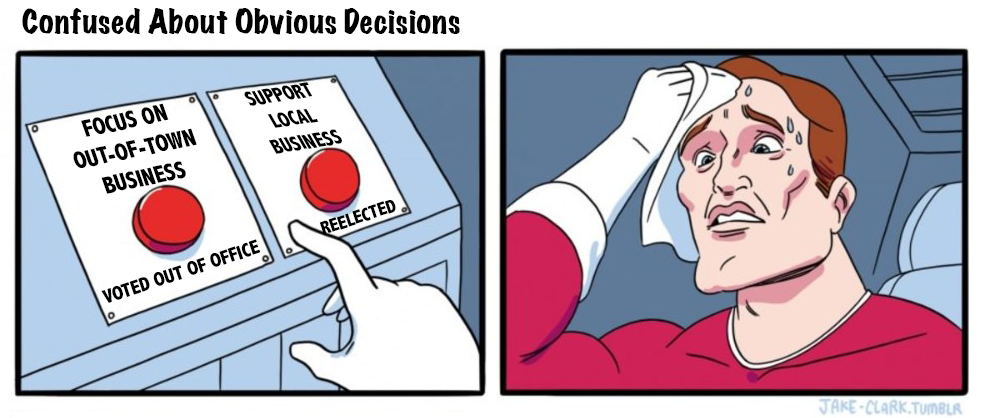
Elected Officials Look Great Creating New Jobs
Another reason helping small businesses is beneficial is because it perfectly aligns with the top priority of economic developers[2] and a common campaign promise of politicians: creating jobs.
Research from the US Bureau of Labor Statistics shows that small businesses create over four times as many new jobs as big businesses. Therefore, a focus on helping small businesses succeed is a strategy that will payoff multiple times more in terms of job creation than centering on a big-business focused economic development strategy.
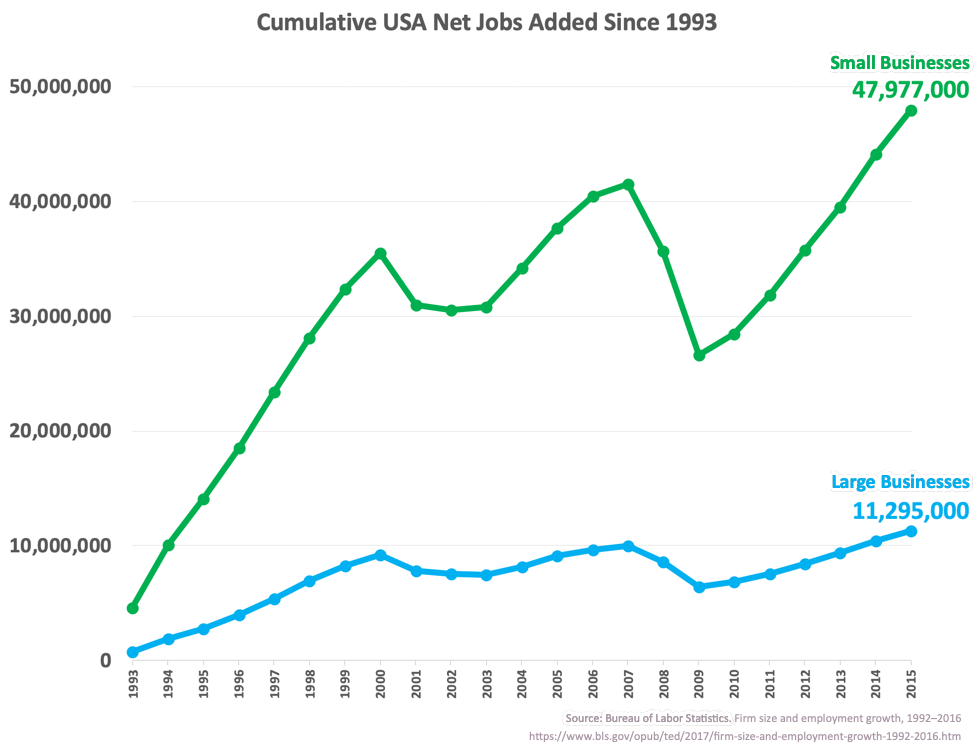
Questions You Can Ask to Assess Local Small Business Support
Here are four questions elected officials should ask their economic development directors to find out if they provide programs that help small businesses and which show that elected officials are supporting local businesses:
- What programs are we (and not some other organization) providing to help our small businesses? You need to show your government’s commitment to local businesses and that you don’t just pass off the responsibility to others.
- What assistance services are provided to our small businesses on our website? Before you ask this, go to your website and search for the services that you provide for small businesses. If there aren’t any, that’s a bad sign. If they are interactive, such as online training and online research assistance, that’s a good sign. If you don’t have these, ask when you can get them.
- How much time is put into helping local businesses compared to recruiting out-of-town businesses? The businesses that are here today are the only ones that pay taxes and employ voters in your electoral district.
- How can you help your economic development director better serve your local small businesses? It’s a partnership in which you both need to help each other.
When Economic Developers Get Love From Elected Officials
Economic developers can proactively help their elected officials look good and succeed. By doing so they will create trust and facilitate a win-win environment for economic development. As the economic developers enable their elected officials to achieve their policy goals those politicians can help direct more support to their economic development director.
The path to making elected officials into champions in the business community is through policies and programs that support small businesses. These local, small business owners and the people they employ can be advocates of economic development and the elected officials who help them succeed. Implementing innovative, traditional, and personal local business assistance is a winning approach.
If you are an economic developer that is already implementing some of these services, you know the benefits they deliver. The next step is to implement more of these programs so that your elected officials can promote the new work they and you are doing to help local businesses.

About the Author: Mark Hays has extensive expertise working with Chambers of Commerce and Economic Development Organizations across the USA implementing online programs to enable small business success. He is a sought-after thought leader in online small business assistance and speaking at National League of Cities, SEDC, WACE, International Economic Development Council, C2ER, and state economic development conferences. Mark is Director of Business Development at SizeUp.
More reading on this topic:
How External Economic Development Can Hurt Local Politicians
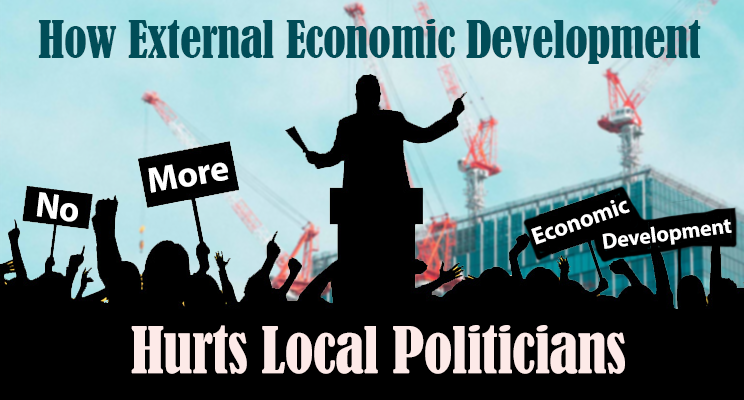
How Small Businesses Get Local Politicians LikeYou Elected
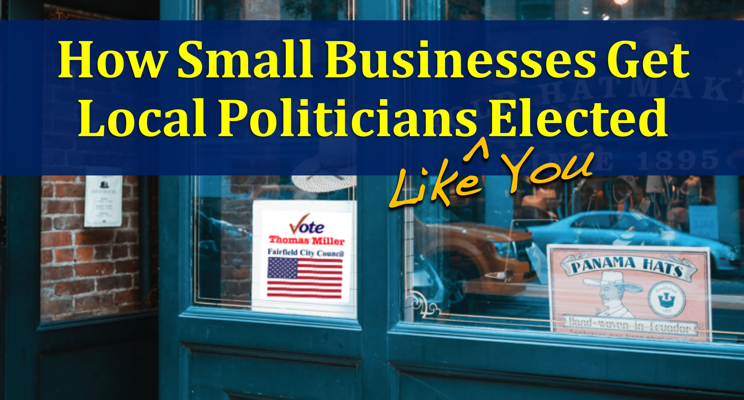
Footnotes
[1] “Military, Small Business, Police Still Stir Most Confidence,” by Lydia Saad for Gallup, June 28, 2018.
[2] International Economic Development Council, “State of the Industry 2019”



